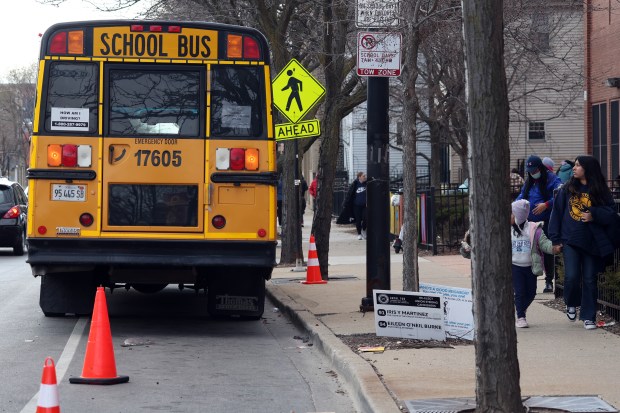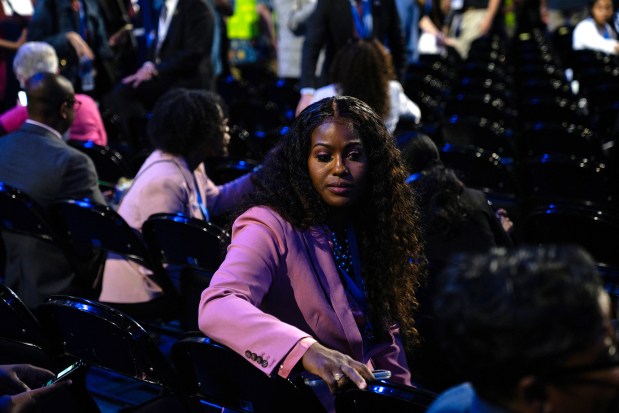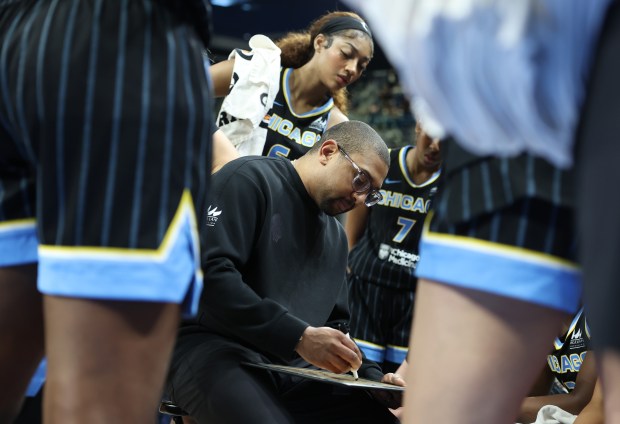At its monthly meeting on Thursday, the Chicago Board of Education listened as union leaders and parents aired their concerns for the new school year.
But as the Aug. 29 meeting showed, the summer did not yield consensus among the district, the teachers union and advocates on solutions to a number of challenges plaguing Chicago Public Schools.
Pressing issues include budget woes, ongoing contract negotiations with the Chicago Teachers Union and solving a problem facing thousands of district families: a busing shortage.
Rumors swirling over the future of Chicago Public Schools’ leadership, specifically its chief executive officer, Pedro Martinez, are not helping matters.
A day earlier, roughly 400 CPS principals and assistant principals sent a letter to Board of Education members, encouraging them to retain Martinez.
As CTU’s criticism of Martinez mounts, the school administrators said that the “atmosphere of uncertainty” regarding his future has colored the start of the school year.
“Every school administrator knows that significant changes at the beginning of the school year can be detrimental to the students, staff, and families we serve,” the group wrote. “That is why we ask you to carefully consider the potential impact that a change in leadership could have on the Chicago Public Schools community.”
These school leaders noted that they wrote the board independently of their union, to “emphasize the importance of stability” amid “the political dynamics at play.”
All of the current board members are appointees of Mayor Brandon Johnson, a former CTU organizer. Johnson has been a key player in lobbying the state for increased education funding — one of CTU’s current priorities — and apparently has made moves to oust Martinez, as was first reported by the Sun-Times.
The group of CPS administrators who signed onto Wednesday’s letter, however, thinks the district should stay the course.
“This letter is not driven by fear of change, but rather by the belief that such a change is unnecessary at this time,” the group wrote, citing “key initiatives” CPS leadership has launched, including career and technical education training and a needs-based budgeting process. They urged the board to “maintain momentum” by retaining Martinez.
At Thursday’s meeting, Martinez proceeded as usual, providing updates to key concerns for the return to school, including preparations for extreme heat and an update to busing services.
The district’s CEO touted a 600-teacher increase over last year, following criticism from the Chicago Teachers Union about hundreds of paraprofessional layoffs over the summer. And Martinez offered a new timetable for the district’s strategic five-year plan, which aims to prioritize investment in neighborhood schools. It’s set to be published in September, though questions remain about who and what will be included — and left out — in the plan.
Nevertheless, while some CPS administrators affirmed Martinez’s leadership, others pushed back at Thursday’s meeting.
The Chicago Principals and Administrators Association criticized the principals’ letter in support of Martinez. The group, an affiliate of the American Federation of School Administrators, refused to sign on to it. They say they have never had a contract with the district, and Chicago Principals and Administrators Association President Troy LaRaviere said Martinez has not met with them or engaged with them and has “never acknowledged our principals union public(ly), though the CEO acknowledges the teachers union frequently.”
“CEO Martinez, we ask you to begin to show you are worthy of our support by insisting that your bargaining team agree to that simple provision to treat principals and assistant principals with dignity and respect,” LaRaviere said Thursday.
Concerns about the budget also continued.
“What is your Springfield plan?” CTU President Stacy Davis Gates asked CPS officials and the board at Thursday’s meeting. “Because we’ve offered plenty of strategies that have not been responded to or rejected by CPS.” Calls for additional state funding have been a consistent demand from the union this summer.
Though teacher contract negotiations remain underway, Davis Gates also expressed concern that, even without the additional costs of the union’s demands, the district would not have adequate funding in future years due to the drying up of state pandemic funding.
And a new year brings new — and ongoing — challenges for Martinez and the district, some of which were addressed at Thursday’s board meeting.
Top of mind was the recent heat wave, prompting the district to cancel outdoor activities or move them indoors and plan for possible cooling system malfunctions. “We experienced very few issues during the record-breaking heat wave, and those minor things that did come up we were able to deal with them quickly,” Martinez said Thursday.
When it came to busing, however, the district said much was still being determined.
The district has struggled to provide busing services in recent years, facing a nationwide bus driver shortage.
Again this year, CPS could not guarantee district-provided transportation services to all students in the district who would ordinarily qualify for it — students with disabilities who require transportation, students in temporary housing and students at selective enrollment and magnet schools.
At Thursday’s meeting, several parents described their experiences losing busing services.
“My daughter is one of the 2,000 students with IEP transportation who is without a route. I reached out to the call center yesterday and waited on hold for over an hour in order to confirm that a valid transportation request was on file for her,” said Terri Smith, a Kenwood Academy and Whitney Young parent whose daughter has an Individualized Education Plan that includes transportation services.
“My inbox is flooded, my voicemail is full, and my social media feed is a litany of desperation from parents whose kids aren’t routed, whose pickup times are later than the bell times, whose kids don’t have a bus aide (or) air conditioning on the bus, whose bus doesn’t show up, and who’ve been unable to get relief through the STS hotline,” Smith told the board.

Busing was not provided to selective enrollment and magnet schools again this year. Some parents are not satisfied with the alternative options being offered by the district, such as giving out free CTA cards for children to get to school.
“Do you think a 10-year-old girl should have to use public transportation alone to go to school with no guarantee that she’ll arrive safe and sound each day?” said Pulaski International School parent Reyna Hernandez. “Do you want my daughter to go to a school that is worse for her?”
This year so far, the district says it is routing 8,666 students, an increase of 2,135 students from last year. Still, 1,155 students with disabilities are left without a bus route this year, compared with 594 last year, due to increased requests for district-provided transportation services. Additionally, Martinez noted that the number of drivers has topped 1,000, a slight increase from last year — even in light of a downtick of 100 paratransit drivers.
These increases come amid a strike by unionized drivers at SCR Medical Transportation, a company that provides paratransit services and transports some CPS students. The group of drivers, who are represented by the Teamsters Local 727, went on strike Aug. 16.
At Thursday’s meeting, the district’s contract with SCR and several other paratransit vendors was renewed.
Continued concerns about charter schools also arose on Thursday, with charter parents seeking answers from the district about the future of their children’s schools in light of the strategic five-year plan’s focus on neighborhood schools.
Other measures approved by the board include an approval to switch the district from SAT to ACT testing, following a decision made by the Illinois State Board of Education, and an approval for the district to sell the unused Carver Elementary School building to a community group — People for Community Recovery — which plans to turn the property into the Hazel Johnson Center for Environmental Justice.
But, while the new school year brings a host of new plans and new challenges, it’s also an opportunity to start over, Davis Gates suggested Thursday, addressing the mounting tensions between her union and the district in recent months.
“Even if I know you and we didn’t get along last year, we’re both going to try and figure it out this year,” Davis Gates said. “I want to take this opportunity for us to get it right as people who are in a group project together. This is a group project.”
The Tribune’s Sarah Macaraeg contributed.





